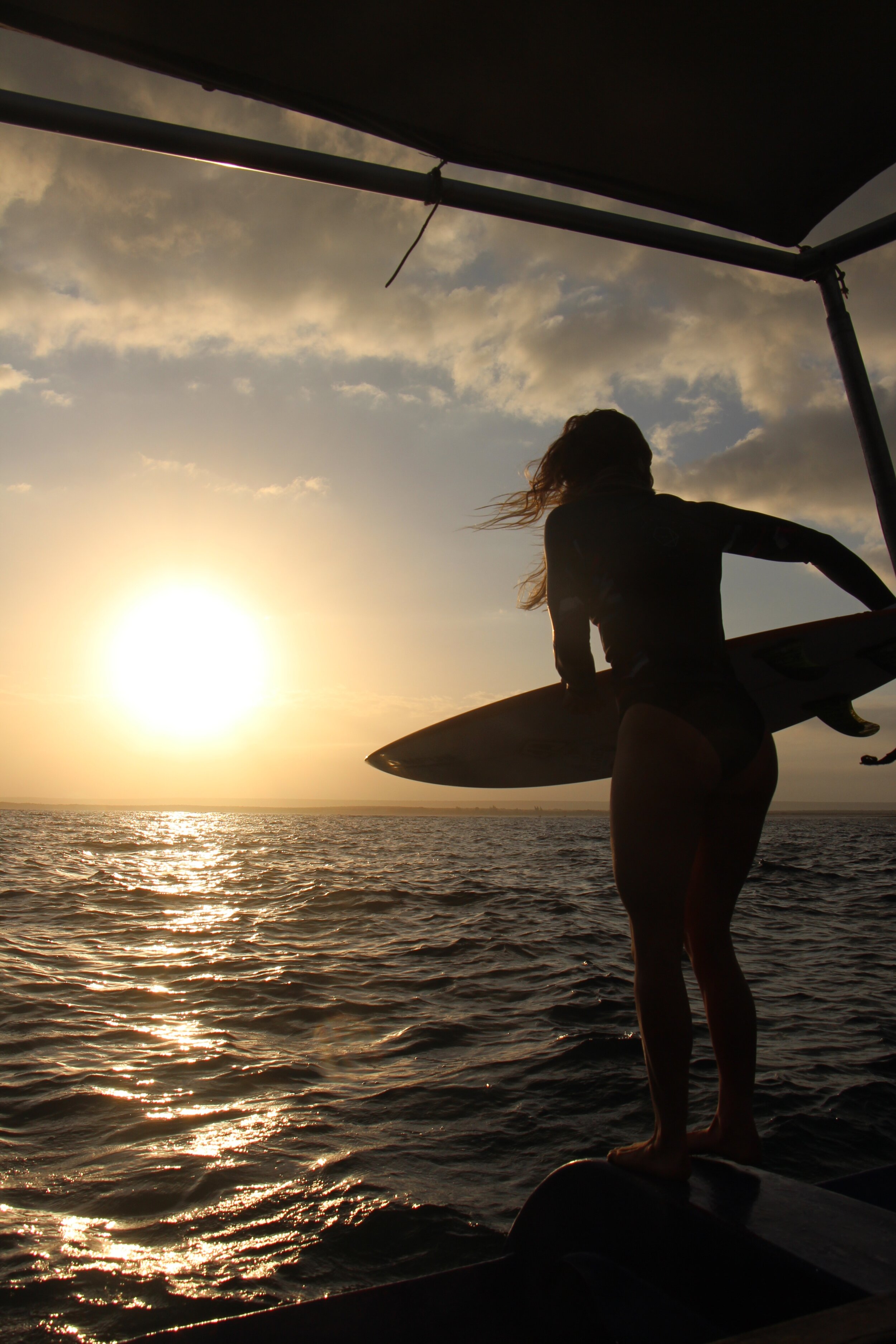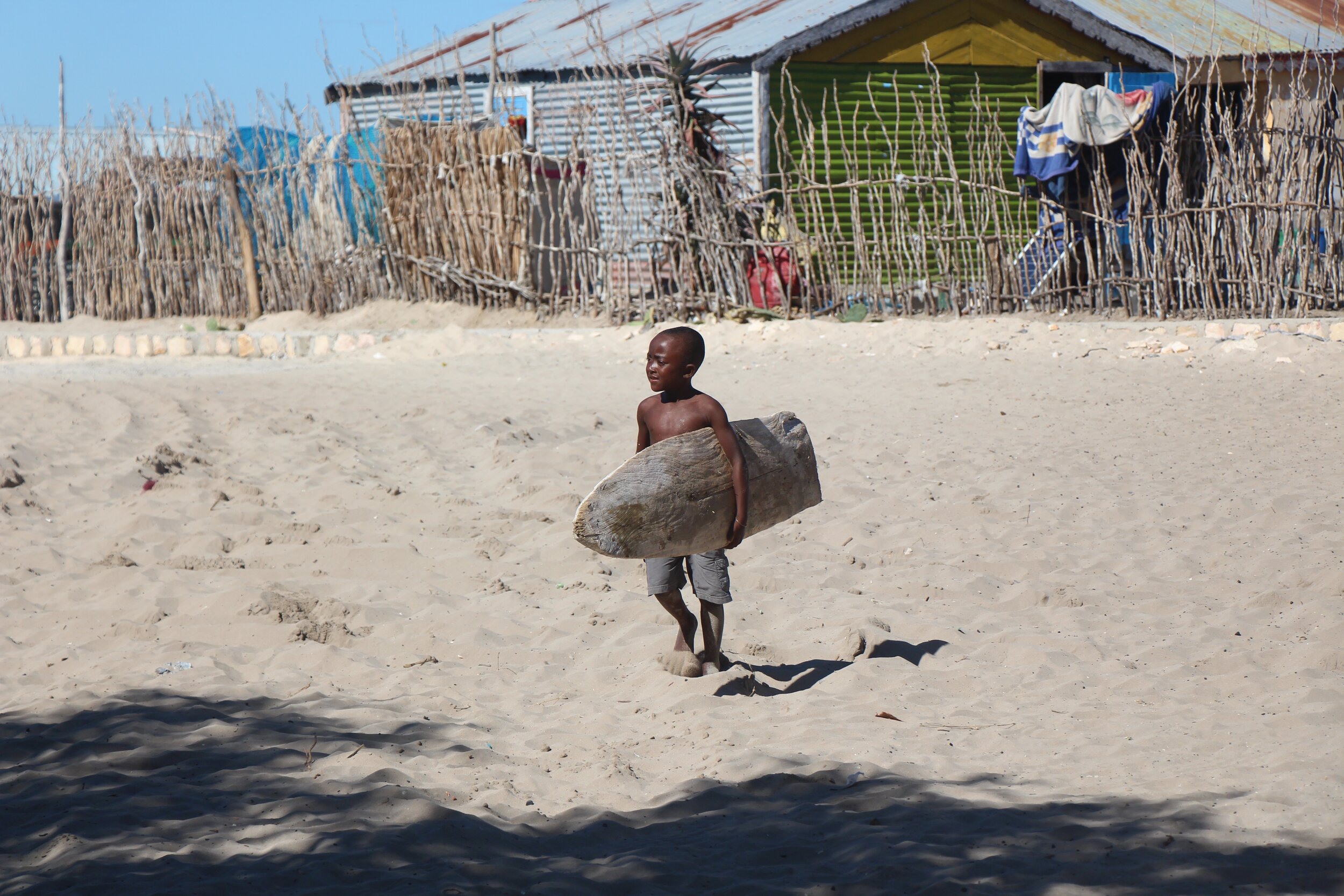Beach-hopping, butt-naked, joyful Madagascan kids showed me how to be a bolder surfer
by Elly Whittaker
Two fins crested the water ahead of us and we craned over the side to get a look at our new travel buddies. There must have been 30 dolphins in the water in front of us, small grey-blue bodies darting around the nose of the boat. We were mesmerised. Our visitors played with us for a few blissful minutes and then the captain picked up pace and we sped away.
We were heading to a remote fishing village in Southern Madagascar to stay in a surf camp by a turquoise lagoon. The spot was as picturesque as it was remote. In the afternoons, as the fishermen raced boats carved from tree trunks, clouds of steam rose up in the distance from humpback whales crossing the Mozambique Straights.
In this peaceful spot the sound of children singing and dancing rings across the bay all day long. When there is even a ripple of a wave, the kids grab their homemade surfboards and race into the water naked (why bother with trunks?!).
These beloved surfboards boards were water logged tree trunks that might just have been freshly torn from the ground.
We were a small group of travellers on the surf trip, two pro surfers from the qualifying series of the World Surf League, a physiotherapist from Ireland and a surf coach from Portugal – it wasn’t long before the lightheartedness of Madagascar permeated us, setting the tone for our whole trip.
In the surf we whooped each other into every wave and shouted tips to each other as we passed. Even on the biggest days the atmosphere was lighthearted and supportive which, I noticed, gave me to confidence to choose challenging waves that I would normally shy away from.
After a couple of days of pure joy in the water, Leonor, one of the professional surfers, introduced an idea that put the experience into perspective.
‘Affordance’ is a term coined by an American psychologist in the 70s, the idea is that we perceive the world in terms of possibilities for action, and our intentions and capabilities define what we consider to be a suitable environment.
I’ve never come across a description so befitting surfing before. In an activity so fast-paced and instinctual, intentions define the way we surf. If your sense is that you cannot surf in certain conditions, your body will react suitably, you’ll be too slow on the take-off and you’ll probably bail your board – but if you increase your comfort zone to encompass the conditions you’re in, the chance is that your reactions will adapt to allow you to surf those waves.
That might sound blindingly obvious, but the role of fear in surfing is important. When we are confronted by a situation that scares us, our idea of what is possible is limited and as a result, our bodies limit our capacity to handle the situation.
If we feel overwhelmed our breath becomes short and our ability to think creatively and to adapt is limited. The sympathetic nervous system kicks into action and we cannot hold our breath as long as normal.
When we are controlled by our fears, our affordance, or our perception of what is possible, is limited.
Yes, you need certain paddling and pop-up skills to get you around but so much of what limits us is ourselves. In Madagascar I surfed next to women who paddled into the biggest waves, risked the biggest wipe-outs and pulled it all off.
When I found myself in a situation that challenged my comfort zone I thought of those children on the beach, of the joy and curiosity of this vibrant paradise. When I allowed myself to feel comfortable, allowed myself to believe that I could surf in those conditions, I found I could.
So now, when things get overwhelming in the surf, I think of those kids dancing on the beach, I choose playfulness over fear.







